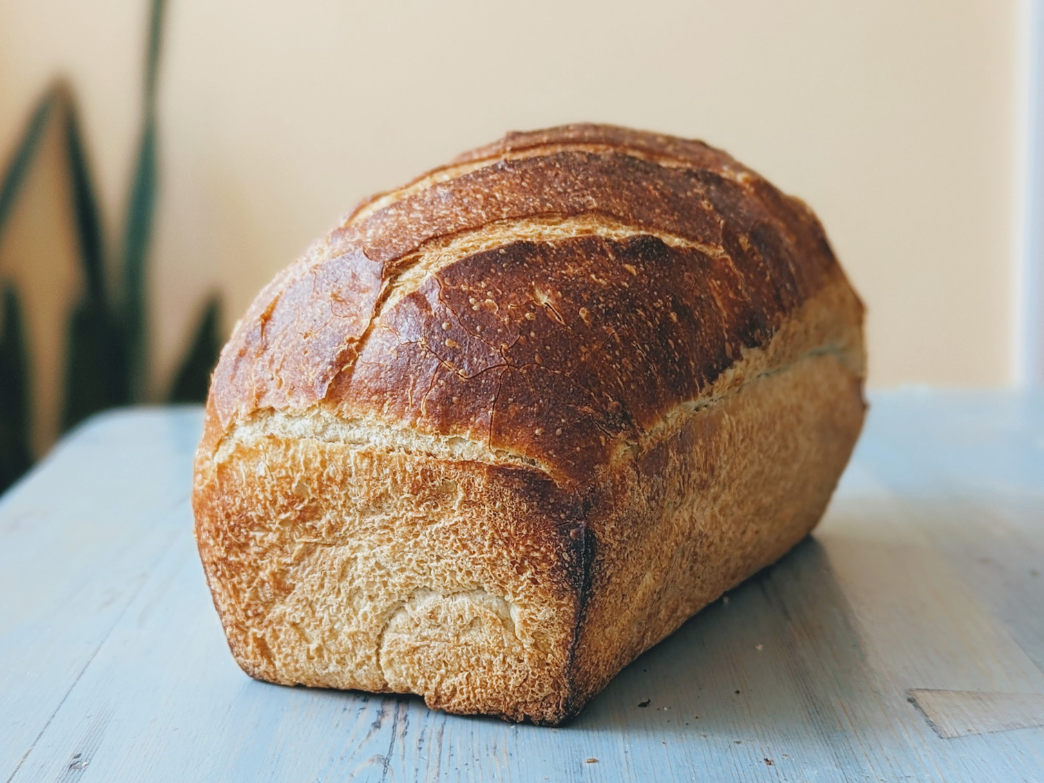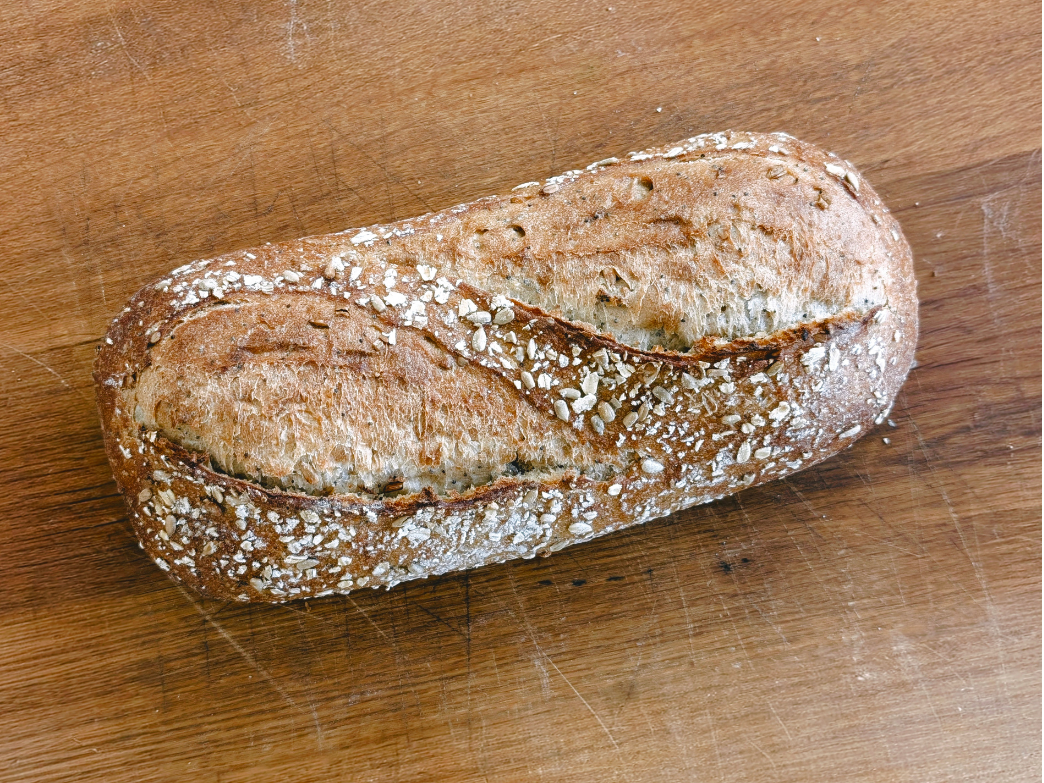By Dr. Jorge, Ph.D.
Wildgrain, opens in a new tab is the first bake-from-frozen subscription box for sourdough breads, fresh pastas, and artisanal pastries.
Are you struggling to keep your bread fresh for longer than a couple of days? Whether it’s turning stale or growing mold, improper storage might be to blame. Read on as we explore the most effective bread storage methods to help extend your bread’s shelf life and keep it fresh until the last slice.
What is the best way to store bread to keep it fresh? Where should bread not be stored?
The best way to keep bread fresh is to store it in a cool, dry place at room temperature, ideally using a paper bag or other breathable material. For long-term storage, freezing bread in an airtight container is most effective. In contrast, the refrigerator is one of the worst places to store bread, as it speeds up the staling process. As bread cools, the starch molecules recrystallize, causing it to become hard and stale. This process is significantly slowed in the freezer, which is the reason freezing is ideal for prolonged storage. Storing bread at room temperature also helps delay staling compared to refrigeration.
Is it better to store bread in paper or plastic? Can you store bread in a plastic bag? Does bread mold faster in a plastic bag?
Storing bread in paper bags is generally better than using plastic bags. Paper bags are more breathable, allowing for air circulation that can help to keep the crust crisp and prevent the bread from becoming soggy. In contrast, plastic bags tend to trap moisture, which can encourage mold growth and spoilage. Plastic bags might also alter the flavor of the bread, as bread may absorb the taste or smell of the plastic. However, in very dry climates, plastic bags might be an option to prevent bread from drying out too quickly.
What is the best container to keep bread fresh? What material is best to store bread in?
Bread boxes are the best containers to keep bread fresh. A bread box is typically recommended as the best method for bread storage because they are designed to balance moisture and airflow, helping to prevent both mold and staling. In addition to bread boxes, other great storage methods for bread include paper bags, linen bags, and kitchen towels – all of which help to preserve bread freshness while reducing the risk of mold.
Do bread boxes actually keep bread fresh?
Yes, bread boxes really do keep bread fresh! Bread boxes are designed to allow just enough airflow to maintain the perfect balance of moisture, which can help bread from drying out or growing mold too quickly. While bread boxes can’t keep bread fresh forever, they can significantly extend the freshness of bread, so you have more time to enjoy it.
Does bread last longer in the fridge or on the counter? Is it better to store bread in the freezer?
Bread will last longer when stored on the counter in a bread box or paper bag, rather than in the fridge. The cold temperature of a refrigerator will speed up the staling process while storing the bread at room temperature will help to preserve freshness. If you don’t plan to eat the bread soon, freezing might be a better option. The freezer will slow the aging process and keep bread fresh for several months without losing quality.
Is it okay to freeze bread? What is the best way to reheat frozen bread?
Yes, it is absolutely okay to freeze bread! Freezing bread is ideal for long-term storage as it effectively halts the aging process. The best way to reheat frozen bread is to briefly run the frozen loaf under cold water before placing it in the oven at 350 or 400 degrees Fahrenheit for 15-20 minutes. For individual slices, you can also reheat the bread in a toaster or toaster oven.
What is the best way to store sourdough bread? How do you unfreeze sourdough bread?
The best way to store sourdough bread is similar to the recommended methods for other types of bread. A bread box, paper bag, linen bag, or even a kitchen towel all work well—any approach that allows for airflow while keeping the bread at room temperature is ideal. To unfreeze sourdough bread, briefly run a whole frozen sourdough loaf under cold water, then place it in a preheated oven. For individual slices, reheating in a toaster oven works great.
Can you freeze bread dough?
Yes, you can freeze bread dough! Bread dough generally freezes well and is a convenient way to have dough ready to bake anytime. For best results, it is recommended to freeze yeasted bread dough, such as sourdough bread dough, after its initial rise and once it has been shaped into its final form. To prevent bread dough from drying out in the freezer, be sure to wrap it tightly.
What kind of bread lasts the longest? What is the best bread to stay fresh?
Due to added preservatives, pre-packaged store-bought sandwich loaves typically last longer than other types of bread. In terms of fresh or homemade bread, sourdough bread and whole grain bread tend to stay fresh longer than other varieties. The natural fermentation process and acidity of sourdough bread help to slow the staling process and prevent mold growth. Whole grain bread, which contains more fiber than white bread, can also help to keep the bread fresh.
Where can I buy fresh bread online?
At Wildgrain, we specialize in making high-quality, fresh breads and pastas that are delivered directly to your door. Wildgrain is the first bake-from-frozen delivery subscription service for breads, pastries, and fresh pastas. Some of our popular breads include everything sourdough bread, plain sourdough loaf, and sourdough 7-grain loaf. Learn more about Wildgrain and our artisanal baking and cooking methods.
About the Author
Dr. Jorge has been a public health researcher for many years, holding both a Bachelor's degree and a Ph.D. in Chemistry. They presently work as a medical writer and love being able to assist others in understanding various health and scientific topics.
This content is for informational use only and does not replace professional nutrition and/or medical advice, diagnosis or treatment. It is not a substitute for and should not be relied upon for specific nutrition and/or medical recommendations. Please talk with your doctor about any questions or concerns.



